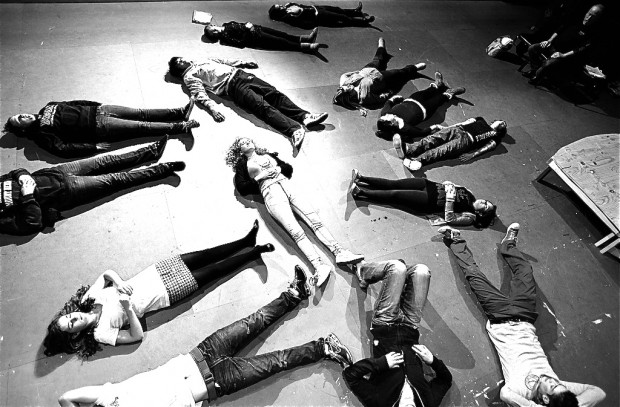Exit Interviews Part I: Theatre schools are strange places

Image by nmhschool licensed under Creative Commons
by Simon Rice
In his 1999 provocation, True and False: Common Sense and Heresy for the Actor, David Mamet asserts, “most teachers of acting are frauds, and their schools offer nothing other than the right to consider oneself part of the theatre… Formal education for the player is not only useless, but hurtful,” says Mamet. “It stresses the academic model and denies the primacy of the interchange with the audience.”
Let me be clear, while I believe Mamet’s edicts to be wonderful conversation starters they are limited in their worth, not to mention hypocritical—he is himself an acting teacher.
Theatre schools are indeed strange places, seemingly full of contradiction. They are almost impossible to describe to someone who hasn’t attended one. At my earliest (and unsuccessful) audition for a prominent Toronto theatre school, I and the other nervous applicants were treated to a half hour lecture on why we shouldn’t go to school for acting. Perhaps this was an attempt to weed out those who didn’t have the conviction or depth of character required to survive three years of physical and emotional turmoil.
Theatre schools, not unlike some other training programs for highly competitive fields, seem to have adopted the baptism by fire approach. If you can survive it, you can survive anything, with the exception, perhaps, of a career in acting.
When I was finally, after several attempts, accepted into a three-year program, it was explained to my class that our “journey” would be structured more or less in three parts.
First year we would be pulled apart, literally and figuratively. All of our preconceptions about the craft would be exposed to the light of day, all of our “blocks” opened, both physically and mentally. Much of this, “opening” would occur while lying prostrate on a studio floor. We would, we were warned, find this process both painful and confusing.
During second year we would slowly and carefully be pulled from the floor and put back together, so that we could hit the stage on our feet in final year, which would consist primarily of full scale productions.
I suppose, beyond sounding slightly cultish, if it worked it would all be worth in the end.
Six years after graduating I look back at my theatre school experience with a mixture of emotion, which ranges from sweet nostalgia to blinding rage. But when I take a deep breath and the feeling passes I start to wonder.
Do theatre schools in all their various contemporary forms serve young aspiring actors well?
My guess is that the answer to that question depends on individual experience. What school, what teachers, what students etc. And there is no doubt, that from school to school, while there are often great similarities, there are also vast differences in styles, methods, approaches and philosophies.
And so it is in the spirit of genuine open-minded investigation that I will begin a series of conversations here on the Praxis website, called Exit Interviews. I will talk to former theatre school attendees, graduates, non-graduates, as well as former students who are now teachers, from a variety of schools across Canada and North America. My hope is to broaden our understanding of the contemporary theatre school, its strengths and weaknesses, through the honest reflection of those who survived it. Stay tuned!
If you attended theatre school and would like to weigh in on this conversation, please leave us your comments below or send us an email to info@praxistheatre.com. I look forward to the debate!


This is going to be awesome.
For years I have told people that theatre schools are at best pestilential mind fucking hell holes and yes, I was the first graduate from the Ryerson Theatre Program. It wouldn’t be so bad if at least the graduates came out with some solid voice work but sadly the ones I have talked with, interview, auditoned etc have poor vocal skills, a huge disconnect between their guts and their mouths and the non white students all seem to feel that they got taken for the last 3 years.
Philip
I am really looking forward to this exploration.
Wonderful idea.
Thought you might like to see this blog entry
http://eighthoursadayatleast.blogspot.com/2010/06/7-clues-that-your-acting-teacher-sucks.html
Paul is, as usual, clear and forthright….and provocative.
Thanks Chris. Very interesting blog. Thanks for the link.
Can’t wait to follow this thread! (Music schools are by and large cut from the same cloth… of course, we spent a lot less time lying on the floor.)
Absolutely love this. I’m not an acting grad but if you are interested in theatre school from a collective theatre perspective (YorkU: Creative Ensemble 05), I would love to be involved.
On a side note, Zing Philip. Zing.
[…] Exit Interviews Part I: Theatre schools are strange places Exit Interviews: Christine Horne […]